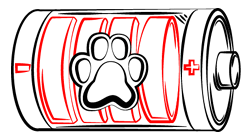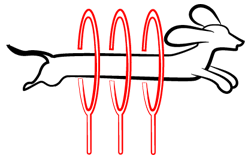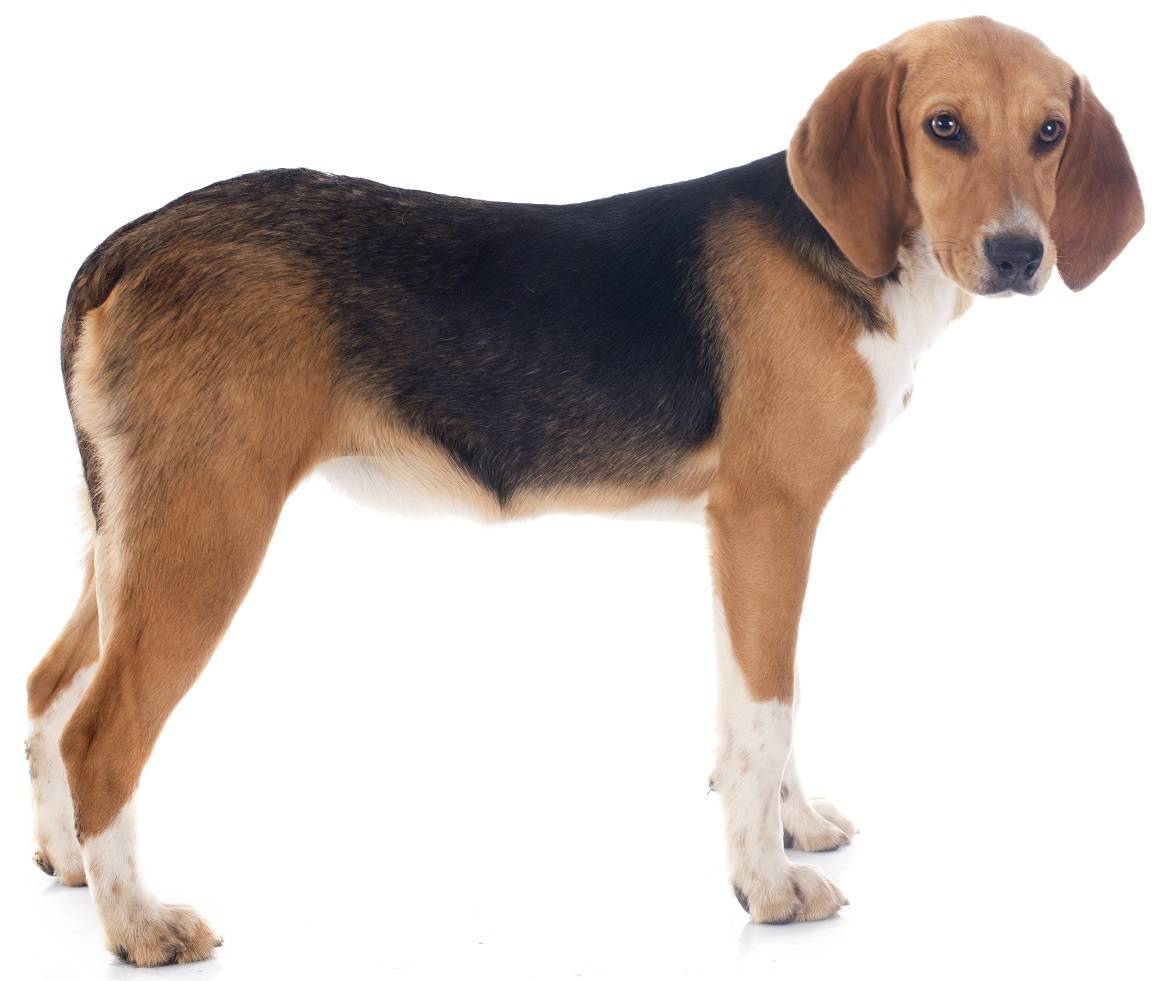
Paws ‘N’ Pups Quickview
Size
| Energy Level
| Trainability
| Paws ‘N’ Pups Rank
|
Characteristics
| Physical Characteristics: Height: 19-21” Weight: 45-60 lbs. Energy Level: Very High | Colors: The American Kennel Club recognizes the Harrier in the following colors:
|
Health & Longevity
Average Life Span: 12-15 years
Harrier Dogs are generally a hardy breed with few health problems. They are not prone to most common canine ailments, although there are a few issues that may affect some Harriers.
Hip dysplasia, a condition in which the thighbone does not fit properly into the hip joint, can impact Harrier Dogs. Hip dysplasia can cause pain, limping, and arthritis. Surgery may be required in severe cases. Although considered a hereditary condition, hip dysplasia can also be triggered by rapid weight gain or injury.
Harrier Dogs may experience perianal fistulas, painful lesions that occur around the anus. These progressive, chronic lesions also result in the formation of deep ulcers. In most cases, perianal fistulas can be treated with an antiseptic solution, although surgery may be necessary in severe cases.
Some Harrier Dogs may experience epilepsy, although this is rare. They also may acquire ear infections and allergies. Unlike most dogs, Harriers are unlikely to suffer from eye diseases.
The majority of Harrier Dogs are extremely healthy, and the average life expectancy for this breed is 12-15 years.
Temperament & Train-ability
The Harrier Dog, a scenthound originally used to hunt foxes and hares, is an extremely high energy dog. He is fun loving with an excellent sense of humor, as well as being sweet, affectionate, and gentle. He is very people oriented and loves spending time with his family.
Apartment life is not well suited for Harriers because they need enough space for vigorous exercise. The ideal living situation for a Harrier Dog would be a house with a securely fenced in yard. As scenthounds, Harriers are prone to wandering away if not fenced in. They are also excellent problem solvers and diggers, so you need a high quality, extremely secure fence to keep your Harrier from getting out. They can live outdoors if properly sheltered from heat and cold, but they prefer to live indoors with their families. A true pack dog, the Harrier considers his family his pack and does not like to be apart from them for long periods of time.
The Harrier Dog loves playing with children, but he may be too high energy for toddlers. If you do have younger children, just be sure to supervise play and ensure that the Harrier does not unintentionally become too hyper or rough. They are reserved with strangers initially, but will become sweet and affectionate over time. They are not aggressive with people. They also get along well with other dogs. However, the Harrier Dog is not suited for a home with cats or other small pets. The hunting instinct is very strong in this breed, and the Harrier may hunt and kill smaller animals, even if raised with them. Be sure to leave food out of reach of the Harrier Dog if you do not want him eating everything in sight. Do not let your Harrier get lonely or bored for a long period of time. Harriers are fairly noisy in general and often “sing” loudly, but if they become bored or lonely they will bark, howl, and bay. If your dog will be alone for a large portion of the day, consider getting a second dog as a companion. Adequate exercise and training will also help reduce his tendency to noisiness.
Because the Harrier is such a high energy breed, they do need plenty of activity and exercise. At least one hour of quality exercise each day is necessary to prevent him from becoming restless, loud, and potentially destructive. A jog is adequate, but he also loves ball games and fetch. He enjoys hunting, sniffing, and trailing, so a long walk on which he can pick up a variety of scents will be enjoyable.
Training a Harrier Dog can be slightly challenging. Although they are highly intelligent and have strong problem solving skills, they are also stubborn, independent thinkers. Hunting commands will be learned quickly and easily by a Harrier Dog, because it involves a task he genuinely enjoys, but less interesting household commands will be more difficult. Train your Harrier Dog in short, upbeat sessions, and use firmness and consistency. Give your Harrier positive reinforcement in the form of praise, extra play time, or treats of cooked meat. With a little patience and effort, a Harrier Dog can become very well-trained. Although not many compete in obedience training, they are a breed that has the capacity to do so.
Grooming
The Harrier Dog has a short coat that sheds moderately and is easy to groom. A quick weekly brushing with a hound mitt or curry brush is sufficient.
Bathe your Harrier as needed, typically once a month. Brush teeth two or three times a week to keep gums healthy and prevent bad breath. Trim his nails as needed to prevent overgrowth and breakage. When his nails are long enough to make a clicking sound as he walks, it is time for a trim. Additionally, check his ears for signs of infection such as redness, tenderness, or a bad odor. Clean his ears if there is too much buildup of wax, dirt, or debris.
Diet
Due to their high energy levels and frequent activity, Harrier Dogs need a high quality food. Dry food is best because wet, canned foods can lead to dental problems. Harrier Dogs love food and will eat as much as you give him, no matter how full he may be. For this reason, it is important to control his intake to prevent weight issues that will lead to health problems. The correct amount of food for your Harrier Dog depends on factors like age, size, build, and overall activity level.
Be sure clean, fresh drinking water is readily available for your Harrier Dog at all times.
Looking for a Harrier?
 Find A Harrier Breeder |  Harrier Puppies For Sale |  Adopt A Harrier |
Cost
The Harrier Dog is a rare breed, with typically less than one hundred Harrier puppies registered in the United States annually, sometimes far less than one hundred. It may be hard to find a Harrier puppy, but they are not expensive despite their rarity, typically ranging in price from $200 to $400. Be prepared for a long wait to find the right puppy.
Paws ‘N’ Pups Ranking
Paws ‘N’ Pups ranks every breed out of 4 with 1 being easiest to integrate into your life and 4 being the toughest – The lower the ranking the better.
Ranking takes into account a few basic factors including cost, skill level needed, high vs low maintenance and how critical regular training is to success. The Harrier Dog ranks a 3. He is an excellent, loving, and loyal companion who is not aggressive with people or other dogs, has few medical issues, and is relatively low maintenance in regards to grooming. However, he may hunt and kill smaller pets due to his very strong hunting instinct, and he may be very noisy, particularly if lonely or bored. The Harrier Dog requires plenty of activity and exercise to prevent him from becoming restless and destructive, and he needs a trainer who can handle his independent and stubborn ways.
Breeds Similar To Harrier
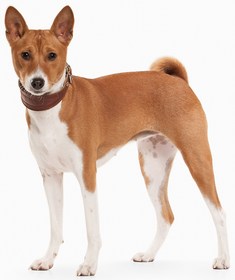 Basenji | 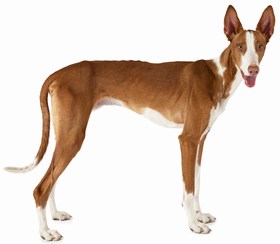 Ibizan Hound | 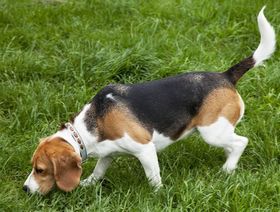 American Foxhound | 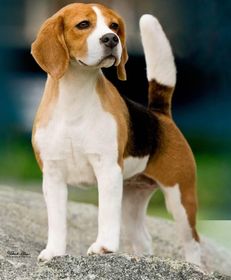 English Foxhound |


